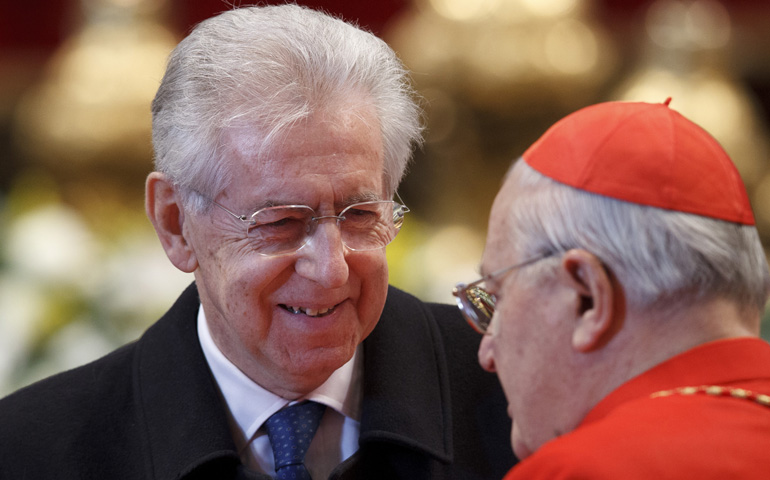
Italy's Prime Minister Mario Monti talks with Cardinal Angelo Sodano, dean of the College of Cardinals, Jan. 6. (CNS/Paul Haring)
The eyes of the Catholic world may be on the election of the next pope, but for Italians, it’s only one of two races competing for their attention. The other is formed by Italy’s national elections, which ended Monday night in what one analyst has described as “utter and chaotic uncertainty.”
In a nutshell, the main center-left and center-right parties finished in a near dead heat, while technocratic Prime Minister Mario Monti drew barely 10 percent of the vote. The big winner was the “Five Star Movement” around former comedian and blogger Beppe Grillo, who ran on an anarchic “up yours” platform vis-à-vis the establishment, and whose crop of political novices apparently will form a major bloc in the lower house of parliament.
For sure, these two elections are wildly different. The Italian race was decided by millions of voters; the next pope will be chosen by an electoral college of just over 100 cardinals. Italy has been saturated for weeks with political ads; nobody openly campaigns for the papacy, and if they’re ever seen to be doing so, it’s usually the kiss of death. There’s certainly no equivalent of Grillo, a rabble-rouser vowing to set the entire system on its ear, among the papabili.
Nonetheless, the Italian race and the more subtle politics surrounding the choice of the next pope intersect in two small ways, both of them related to the fact that the preferred candidate of the Vatican and the Italian bishops, Monti, had such a dismal night.
There’s no doubt about the ecclesiastical blessing Monti carried. Pope Benedict XVI has received Monti seven times in the short time since he took office. On background, Vatican officials have given reporters approving comments about “the Professor,” as Monti is dubbed in the Italian press. Recently L’Osservatore Romano carried an elegiac essay about Monti’s “noble commitment to recover the highest sense of politics,” while Vatican spokesperson Jesuit Fr. Federico Lombardi made a point of announcing Benedict’s Christmas good wishes to the prime minister. Cardinal Angelo Bagnasco of Genoa, president of the Italian bishops’ conference, has said that Monti’s “honesty and ability have been commonly recognized.”
Monti returned the favor. He put prominent Catholics in his cabinet, including Andrea Riccardi, founder of the Community of Sant’Egidio. He worked out a deal to avoid forcing the church to repay tax subsidies the EU had judged to be illegal and limited the exposure of church-run hotels and hospitals to new property tax requirements.
Monti entered the race for re-election late, and given the wide unpopularity of his austerity measures, never had any realistic hope of outright victory. His strategy instead appeared to be to win enough votes to be a king-maker in forging a governing coalition, but his poor performance makes even that now unlikely.
Here are the two ways in which the Italian outcome could overlap with the looming conclave.
First, it may add to the ambivalence about electing an Italian pope. There was already an anti-Italian humor brewing, with some cardinals grumbling that Benedict XVI “re-Italianized” the Vatican over the last eight years and paid a steep price for it, watching as his papacy was sometimes run off the rails by Italian tribal rivalries.
Now, some cardinals may look at the Italian results and ask: If the bishops of Italy, with all the resources at their disposal, can only deliver 10 percent of the vote for their preferred candidate in their own backyard, what does that say about their capacity to project influence and leadership in other parts of the world?
The second bit of fallout is broader. Some cardinals may look at the results and worry about the church’s apparently declining influence in Western societies. They may wonder if the church needs a pope with a greater capacity to stir grassroots enthusiasm and to inject Catholic values into secular debates.
In other words, the Italian results may nudge the cardinals in the direction of seeking a more political pope, someone with a track record of being able to wield his bully pulpit successfully.
Two factors suggest these conclusions are probably not make-or-break considerations.
First, it’s clearly wrong to suggest that Monti lost because of his ties to the church. Italians love theater, and the legendarily reserved Monti was simply no match for the flamboyance of either Grillo or conservative former Prime Minister Silvio Berlusconi. On the issues, most Italians spurned Monti because they don’t like paying higher taxes and getting fewer public services, not because he goes to Mass every Sunday.
Second, given the bombshells that have gone off on the church beat in recent days -- speculation in the Italian media about a supposed “gay lobby” in the Vatican, the resignation of Cardinal Keith O’Brien in Scotland, continuing controversy about the participation of Cardinal Roger Mahony and others in the conclave -- most cardinals probably won’t have much attention left over for the intricacies of the Italian political scene.
Nonetheless, the fact that Italy appears headed for political crisis at the very moment the cardinals of the world are gathering in Rome to bid farewell to Pope Benedict XVI, then to elect his successor, is a striking coincidence.
Those cardinals inclined to ponder what it means may do some thinking along the lines sketched above.
